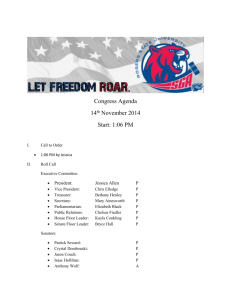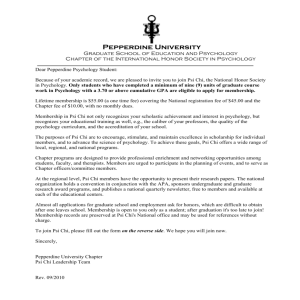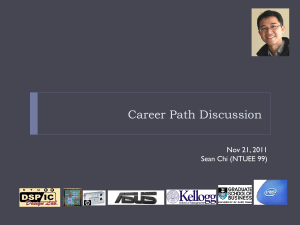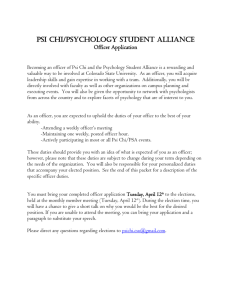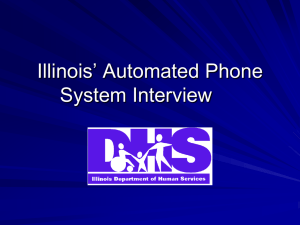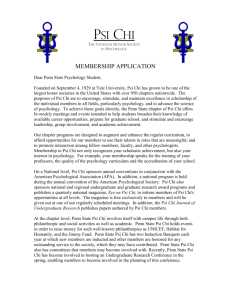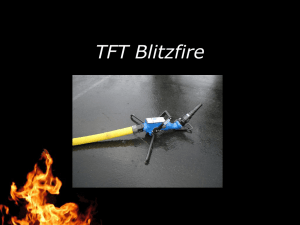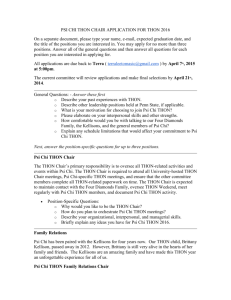Presentation File ()
advertisement
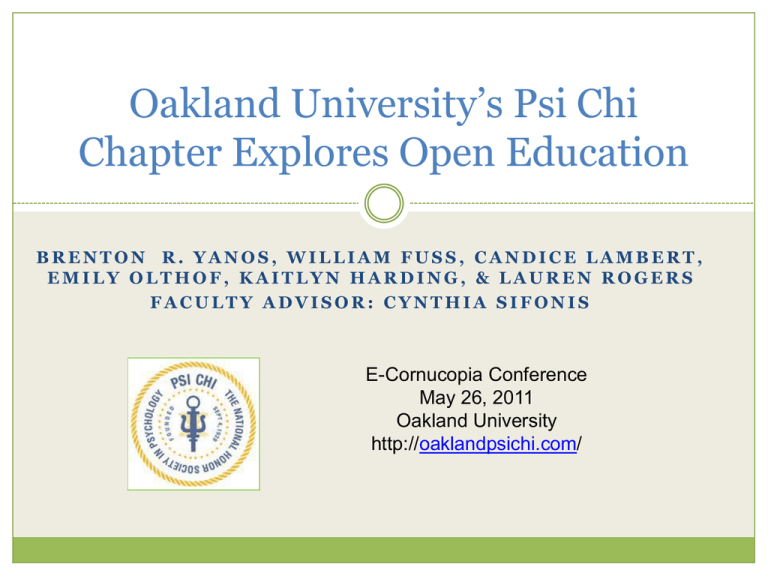
Oakland University’s Psi Chi Chapter Explores Open Education BRENTON R. YANOS, WILLIAM FUSS, CANDICE LAMBERT, EMILY OLTHOF, KAITLYN HARDING, & LAUREN ROGERS FACULTY ADVISOR: CYNTHIA SIFONIS E-Cornucopia Conference May 26, 2011 Oakland University http://oaklandpsichi.com/ Psi Chi: the International Honors Society Purpose: to encourage, stimulate, and maintain excellence on scholarship of the individual members in all fields (particularly psychology) Goals: academic recognition & nurture a climate congenial to creative development How? New pathways using technological advances Open education Theory that knowledge should be transparent and accessible to anyone who wants to learn Why have an open education policy? History of students wanting content from our events but not being able to attend Oakland University’s commuter population Many non-traditional students Inopportune times of events, allowing certain student populations to not benefit OU’s class schedule Work, family responsibilities, distance, etc. Focus on new events each year (with traditional events being made available online) The Student Perspective Educational institutions should take advantage of the growth in technology Rising OU population = more non-traditional students Convenience Information could reach undergraduates otherwise unable to attend educational events. “Commuter school” at OU Students can participate in group learning activities without actually be situated in the same location. The Student Perspective “Supplemental education” Online content supplements but does not replace traditional educational formats Only when combined with traditional formats do students recognize the benefits of eLearning (Serwatka, 2002) Reexamining “live” information to investigate information possibly missed. Classroom interaction is important for educational and social purposes. How will a student ask questions? Students: The Natural Procrastinators Students may severely underestimate the amount of time needed for online learning Students must be motivated to look for/access online material. The Student Perspective Student adaptation Overestimation of student technological abilities The college age group may indeed find it difficult to adapt to this new way of learning Lack of IT skills is one of the main reasons for student nonparticipation in eLearning environments (Wilson, 2001) O’Connell (2002) proposes that some students may experience problems with the eLearning process Access to information? Students still have the option of using computers at school if one is not available in the home Time limit Psi Chi’s Perspective Post facto: open education benefits students who were unaware of certain events at the time they occurred Open education allows students from other Psi Chi branches to gain knowledge from sources outside their respective universities. Creating organizational bonds between Psi Chi members from across the U.S. Thereby broadening the educational goals of Psi Chi. Preparation for this conference! Use of eLearning tools Existing Online Psi Chi Content Podcasts Psi Chi Psychology conference at Drexel University (March 2006) Six research presentations http://itunes.apple.com/us/podcast/psi-chi-cast/id140683358 University of Connecticut Fifteen total topics http://www.psychology.uconn.edu/resources/podcasts.html Sonoma State University Five lectures on Autism Existing Online Psi Chi Content Oakland University content on iTunes U • There is some non-lecture content posted on iTunes U • • • They are not getting many hits. This could be because the podcasts are not really geared to undergraduate students Lecture content on iTunes U have gotten many hits • • Dr. Sifonis has on average 15 hits on every lecture content of hers. Possibly because the content is for undergraduates • Our current workings: • • http://www2.oakland.edu/psych/psichipodcast.xml Downloads of non-lecture content geared towards undergraduates • Hypothesized to result in a moderate amount of hits Future Online Psi Chi Content Expecting: More Psi Chi chapters to be using iTunes U Share knowledge about different events Post how to become or apply for an officer position Post workshops that are held every year to open up space for different workshops Focus efforts elsewhere Philanthropy Outside researchers Joint events Future Direction Limited data exists However, open education is predicted to benefit many undergraduates and professors here at OU Professors can: Have more lectures online as supplemental materials Enjoy multiple benefits Can help with finding research assistants Can make teaching more interactive Lectures can be heard from people outside the university Increase awareness of open education across Psi Chi chapters, student organizations, and educators Issues Before Recording Faculty Permission Approval to be recorded Fear of being recorded Releasing Power Point Presentation Psi Chi Officer Learning Curve How to use voice recorder/video recorder Equipment set-up New software Audacity Camtasia (other future programs) Issues After Recording Audacity Time Editing “dead air”, “Q&A” and um’s and ah’s Adding intro Uploading content to iTunes U/website Problems: Sampling bit rate Sound differences between computer source and online content Time demands New officer position Benefits of Using Audacity Audacity Open source File size Saving in different formats Video Recording Benefits Visual and audio content work together to enhance the learning experience Limitations Video recordings not currently being used File size limitations on iTunes University Bandwidth issues for hosting videos on our website Harder to edit Faculty are uncomfortable being video-taped Time taken to prepare a “mock presentation” Future Goals Camtasia Having a “standard” workshop available enables More time for student “Q&A” More hands-on experience at workshop Open up time for other new workshops Give students who are unable to attend the presentation an opportunity to benefit New Officer Position Open education Editing clips Psi Chi website Need for Psi Chi laptop Files in one place Programs on one computer Stays in Psi Chi References O’Connell, B. (2002). A poor grade for eLearning: Classroom students did better. Workforce, 81(7). Serwatka, J. (2002). Improving student performance in distance learning courses. The Journal of Technological Horizons In Education, 29(9), 46-52. Wilson, J. (2001). Lessons of a virtual timetable: Education. The Economist, 2.
